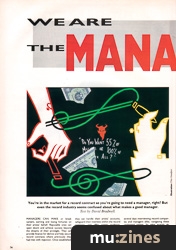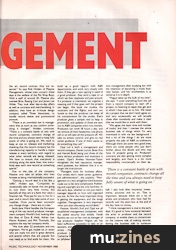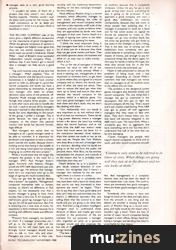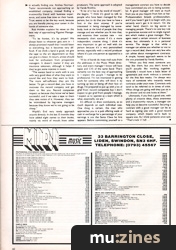Magazine Archive
Home -> Magazines -> Issues -> Articles in this issue -> View
We Are The Management | |
Article from Music Technology, November 1988 | |
Who are the music biz' management, and do you really need them? David Bradwell talks to the people who take care of the stars and their affairs.
You're in the market for a record contract so you're going to need a manager, right? But even the record industry seems confused about what makes a good manager.

Image credit: Clive Goodyer
MANAGERS CAN MAKE or break careers, earning and losing fortunes on their artists' behalf. Reputable ones can open doors and achieve success beyond the dreams of their proteges. They can provide finance for demos and help secure record contracts where previously they had met with rejection. Once established, they can handle their artists' accounts, safeguard their interests within the record company, and offer career guidance. Within the industry, opinions differ as to what constitutes a good manager. Most managers will tell you that they provide an essential service, but record companies don't necessarily agree. I recently spent several days interviewing record companies and managers alike, navigating these uncharted waters. So what exactly do managers do?
"I USED TO think that managers just took money from their artists and I wish that was true, but if you want a state of the art record contract they are essential." So says Rob Holden of Massive Management, whose main concern these days is the welfare of the Pet Shop Boys. With a staff of around 20, Massive also oversee Bros, Raising Cain and James Lee Wilde. They look after day-to-day affairs as well as contracts and merchandising. In addition, they have an in-house design company called Three Associates, to handle record sleeve and promotional artwork.
"There is an unwritten law in management that as soon as you confirm something it changes", Holden continues. "There is a constant battle of wits with record companies, contracts change all the time and you always need to keep fully aware of what is going on. We need to keep an eye on releases and marketing, checking that the record company has the manufacturing capacity to handle a major release in every territory, with regard to what other records are being released. We have to ensure that everybody is thinking along the same lines, that everybody sees each new record as something special."
Due to the size of the company, Massive only take on artists who they foresee as being internationally successful.
"Getting a record deal is a bit like a raffle", Holden says. "Companies do occasionally take on bands that are going to cost them very little money, but basically all they are is a bank that takes a financial risk. They pay for you to live for a year, and in return they take some of your royalties. Once you've been successful you change things - there are no rules."
Sarah-Jane Ward handles the European wing of the top record producer management company World's End, looking after the likes of Zeus B Held, Adrian Lee, Martin Rushent and Phil Thornally. She explains the way her company works.
"We look after 22 producers and two engineers. We've got maybe six or seven who are really hot and in great demand, and several others that are popular but may need us to find work for them. We build up a good rapport with A&R departments, and work very closely with them. If they get a new signing in need of a good producer, they send a tape to us which we then duplicate and pass around. If a producer is interested, we organise a meeting and if that goes well the project can begin. We book the studios, the musicians and the flights, and sort out hotels so that the producer can keep all his concentration for the studio. Every producer does a sample reel to help in promotion, and updates of these are sent out to A&R companies every two months. Producers can work 18 hours a day, and we remove all their headaches, one phone call to us will take all the pressure off. We take no artistic control, and give no real career guidance. If one of them wants to do something they will."
Opal Ltd is both a management and record company, Daniel Lanois, Brian Eno and Harold Budd being just three of the many serious producers and musicians it covers. Opal's Anthea Norman-Taylor recognises the bad reputation management possesses, but believes that it is no longer the true picture.
"Managers exist for business affairs. Our artists don't need career guidance, just administration", she explains. "Management is a very straightforward business made out to be very complicated. Publishing and copyright are the only hard bits. In the early days, whether or not you need a manager depends on how well organised you are. At first the most important thing is getting the equipment and the songs together. Management is very important when you start discussing record deals."
Massive, World's End and Opal are all established management companies, with the added security that entails. Vanda Rawlins set out on her own as manager of top producer Stephen Hague, yet has been sufficiently successful to take on an assistant, and now boasts a roster of four artists - Hague, engineer Dave Meegan, producer John Robie (UK only), and Catherine Buchannan, who recently sang on Jellybean's 'Sidewalk Talk'. She moved into management after studying law with the intention of becoming a music business lawyer, and her involvement is as varied as it is in-depth.
"Hague takes up the bulk of my time", she says. "I cover everything from the call from a record company to start off a project, to listening to tapes that get sent in which I then pass on to him. We never do a project that we don't both agree on, and very occasionally we will actually chase after somebody and make it clear that we would like to work with them.
"We agree the basic time and number of tracks, and then I oversee the whole business side of things which I'm very interested in with my law background. I find a lot of the things I do are more properly the jobs of A&R co-ordinators. Although there are some very good ones, there are some people who just don't bother about the details and who may have 15 projects going on. Producers' contracts are also getting more complex and lengthy, and there is a lot more responsibility contractually on their behalf. I also look after insurance, investments, accounts and so on. That is important, because there are a lot of artists and producers who have had hit records over the years but, at the end of the day, have no money.
"I think management is vital in the early days. It's good to have someone between the artist or producer and the record company, to enable them to concentrate on the creative side of making records, leaving the business side to someone else."
Rawlins also oversees her clients' general career development. At the moment, Dave Meegan is working extensively with Hague, which he enjoys, and which his manager sees as a very good learning process.
"I wouldn't let either of them do a project that they weren't into doing", Rawlins expands. "Neither would I ever let them work purely for the money. We make concessions as far as deals are concerned if I think it is a project which is beneficial to them."
"There is a constant battle of wits with record companies, contracts change all the time and you always need to keep fully aware of what is going on."
THE RECORD COMPANY side of the story gives a slightly different perspective on the importance of good management. While the general consensus of opinion is that managers are helpful, most agree that they are not strictly necessary, and in some cases can prove a hindrance. Daniel Miller - head of Britain's most successful independent record company, Mute - believes that if you haven't got a record deal, a manager can help secure a good one.
"Up until recently none of our acts had a manager", Miller explains, "they all worked directly with the record company. Sometimes it is helpful to have another person to refer to, although it's good that record companies and bands can have a good relationship by themselves. A good tour manager who takes no artistic decisions takes some of the pressure off. Depeche Mode manage themselves, although they employ three people - two to look after tours and one to handle the fan club. I used to be put off by managers because I wanted to deal directly with the bands, but now, depending on the nature of the group, I prefer a manager. This is partly because we have grown as a company, to the extent that personal contact with bands has become increasingly difficult.
"Bad managers are worse than no managers at all; a good manager needs to be able to motivate. It is important for producers and engineers to have a contact point outside the studio, because there's nothing worse than being in the middle of a mix and being interrupted by someone ringing up to confirm the next project."
While it would seem that the larger the company the greater is the need for a manager, EMI's Paul Morgan doesn't agree. Formerly with Atlantic, Morgan joined the EMI A&R department just over two years ago. He believes that management isn't too important even up to the stage of signing the much-coveted deal.
"You can get that far just by dealing with a lawyer", he explains. "Management companies themselves refer to lawyers anyway, so there's no difference in that respect. It's not necessarily true that a known manager is going to have more success than a new one. If, for example, a well known, good rap manager has a new rap act, he will be paid attention. But if he is venturing into a new area of music, his reputation is fairly irrelevant because he is working with different media and different contacts.
"Pressure from managers can backfire on them. If a manager pressurises me, I will go to the head of A&R and the chances are he will react back just as strongly. Good managers should know who to talk to, how, why and when. Managers are most useful in their relationship with the marketing department, deciding on the best campaign strategies for new releases."
Mute offshoot Rhythm King is a record company which effectively manages its own artists. Combining the roles of management and record company works well due to the relatively small scale of the company, and only causes problems when they are approached by bands who have managers of their own. Martin Heath is in charge of signing new talent at the label, and is fluent in expressing his views.
"I think the most important thing is that managers have faith in their artists. A lot of them just do it because they think they can get some money and fame. They are totally ignorant about the business and think it's an easy way to make money - which it isn't.
"For us the use of managers is limited, because we tend to refer all of our decisions to our artists anyway. When a band is starting out, management is very important to motivate them, to get them to point where they are signed to a record company and to inform the record company of what the band are about. They have to ensure the band get what they want up to limits and ensure they don't alienate the record company in the process, which is a delicate game. You can't spot good managers until you work with them and that's really why we don't like dealing with them.
"Our relationship with our bands is very important to us, and without that a lot of us lose our motivation. There can be a big power dilemma where a manager knows a lot about the band but nothing about the record business, and at the same time, the A&R man doesn't really know that much about the band. It's in the interaction between those relationships that careers are made or not, as the case may be. People like Tom Watkins who does Bros is the sort of manager who is a visionary, deciding what his bands are going to be like and how the public will perceive them. With Bros, he has entirely manipulated the situation and controls it to the extent that he is probably more important than they are."
Heath believes he is in a position to give bands creative direction in their careers, but recognises that if there's a manager who believes he has the same rights there is a chance of conflict.
"It's not fair to say to somebody who may have been with a band for three years that you're not very interested in their opinions any more", he begins. "That's not to say they don't have good ideas and they can't help you and stimulate you, but there's a difference between that and telling them that the control is in their hands and you are going to do what they want. And that's a big problem. Intelligent managers tend to understand those divisions of labour and maybe get more involved in the promotion of the act overseas. For our purposes, a manager who organises an artist as a personal manager would, and who organises the live side of things and checks up on the foreign licensees is someone of real use.
"The best advice I can give is that if you have a manager, don't listen to how much he bullshits, because that is completely irrelevant. Unless the guy has got a very good, strong track record, everything he says is going to be promises. If you approach a good company and want a good deal, bullshitters are entirely unimpressive, because they see more of those people than anything else. If a manager is prepared to work for a band and he has some access to capital he should be prepared to invest it. The manager can go onto another band, but the artist has generally only got three to five years in the limelight to earn a living. That is the best way of sorting out the bullshitters from somebody who genuinely believes in something. I don't mean masses of money, just enough to pay for occasional things like the demo tapes. It's very easy for bands to believe the hype, but what they should look for in the first instance is some real solid back-up."
"Contracts only tend to be referred to in times of crisis. When things are going well they just sit in the drawer and no-one looks at them."
Heath is well positioned to discuss the problems of being stuck with a bad manager. Expanding on Daniel Miller's comment that bad managers are worse than no managers at all, he outlines some of the effects this can have.
"The problem is the dangerous power games managers play between artists and record companies. The one thing that a manager has got to overcome is the assumption that he's got to fight the record company all the way. That's stupid and it just creates a bad feeling. Most A&R men get so pissed off with aggressive managers that they cease to deal with them. They don't freeze them out, but that band will become relegated in the A&R men's eyes. The band think 'What a wonderful guy, he's so aggressive and hard, everything we're not' but they don't understand that half of the time that can be very damaging.
"Clever managers are people who inspire record companies to think and to work, and who record companies actually like. Bad management is a complete disaster area, and has been the death of more bands than I can name. The truth is, there are extremely few good managers; there are fewer good managers than good bands.
"Somebody who comes in here and bangs his hand on the desk and talks about how the artwork is one thing and the sleeves are another is missing the entire point of Rhythm King as a record company, and really would be the reason why I wouldn't sign a band. There are lots of stories of major record companies having managers in their offices, liking a band but hating a manager and deciding that they're unworkable for that reason."
ASSUMING YOU CAN afford to lose the 10-20% of your earnings that a decent manager will charge, the biggest hurdle is in actually finding one. Anthea Norman-Taylor recommends not approaching an established company, instead finding a trustworthy friend with business experience, and some free time on their hands. Trust seems to be the key word, because you are literally placing your career in the hands of someone else.
Rob Holden explains his views on the best way of approaching Massive Management.
"To be honest, it's by prayer! We always listen to whatever gets sent in - I always promised myself that I would listen to everything, but it becomes very difficult. If we think a band is good, we give the tape to the art department so they can give it a listen. In return, artists should look for enthusiasm from prospective managers. It doesn't matter if they are insurance salesmen, although it helps if they've got some interest in music.
"The easiest band to work with is one with very good ideas of what they want to sound like and how they want to look. The more self-sufficient they are the better. To get a record deal, you have to motivate the record company and get them to like you. Record companies respect us because they know we've been successful, and if we take a tape to them they take notice of it. However, they can be intimidated by big-name managers because they know we're not going to be cheap."
World's End very rarely approach anyone directly. In the last 15 months they have added eight names to their books, mainly via word of mouth from other producers. The same approach is adopted by Vanda Rawlins.
"A lot of it has to be word of mouth", she begins. "I think it's good to talk to people who have been managed by that person, but to do that you have to have a foot in the door anyway. If you're interested in being managed by somebody, look at the kind of people that they manage and see whether you fit into that, and examine their success rate - not necessarily chart success if it's a more independent creative thing. I think it's very important to get on well with the person because it's a very personalised service, especially with a record producer where it's just one person as opposed to a band.
"A lot of bands do mass mail-outs from the addresses in the Music Week directory, and every manager I know will have tapes and CVs of the same band. That's certainly not the best way of approaching it. I expect the people I manage to be professional. I'm not interested in getting work for someone who will blow it by turning up late or being off their face on drugs. I'm prepared to put up with a lot of grief from record companies but I don't expect to get grief from people I manage. I expect us to operate as a team which is what, essentially, we are."
It's difficult to draw conclusions, as so much depends on each individual case. One thing is certain, the man who approaches you in a pub offering wads of cash in exchange for a percentage of your earnings is not the Santa Claus he first appears. Before committing yourself to a management contract you have to decide how committed you are to being successful. A good manager will want as much from you as you require from him or her. Professionalism breeds professionalism, and if you haven't got it to begin with, you certainly won't get it in return. On the other hand, there's no big secret to managing people. There's no one key rule to guarantee success and no single ingredient which makes a great manager. Managers need a certain amount of business sense, but ultimately it is a personal service. The danger is that while a manager can advise you whether or not to sign a record deal, there are very few who can advise about management contracts. A simple, honest approach seems to be the one practised by Vanda Rawlins.
"When you first meet someone you may like them, but you don't know if you'll actually like working together. Generally I would have a basic letter of agreement and work without a contract for the first few weeks. I'm always very wary of someone who instantly waves contracts under your nose. Contracts only tend to be referred to in times of crisis. When things are going well they just sit in the drawer and no-one looks at them."
Ultimately, if you find a good one, with plenty of creative ideas, sharp awareness and a trustworthy nature, a manager can help you to become successful. Securing a contract with a good manager can be as hard as signing one with a good record company, which means we're back to square one. As I think someone once said, "That's rock 'n' roll..."
More with this topic
Street legal - Negotiating a record contract |
 The A&R Men |
 The Cannes Scam |
Rock In Opposition |
 Copyright or Copycat |
State of Independence |
The Endorsement Syndrome |
On The Record - What A&R Managers want from your demo |
Getting A Record Out |
 Are You Insured? - How To Avoid Losing Everything |
 Everybody's Doin' It |
The Managers |
Browse by Topic:
Music Business
Publisher: Music Technology - Music Maker Publications (UK), Future Publishing.
The current copyright owner/s of this content may differ from the originally published copyright notice.
More details on copyright ownership...
Feature by David Bradwell
Help Support The Things You Love
mu:zines is the result of thousands of hours of effort, and will require many thousands more going forward to reach our goals of getting all this content online.
If you value this resource, you can support this project - it really helps!
Donations for January 2026
Issues donated this month: 0
New issues that have been donated or scanned for us this month.
Funds donated this month: £0.00
All donations and support are gratefully appreciated - thank you.
Magazines Needed - Can You Help?
Do you have any of these magazine issues?
If so, and you can donate, lend or scan them to help complete our archive, please get in touch via the Contribute page - thanks!















